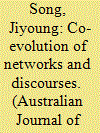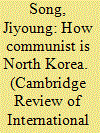| Srl | Item |
| 1 |
ID:
153313


|
|
|
|
|
| Summary/Abstract |
This article uses an eclectic approach of network and discourse analyses to examine symbiotic relations between the formation of professional networks and the constitution of normative discourses in international affairs. Based on more than 2000 English and Korean mixed materials about the five most-mentioned North Korean defector-activists in the media in 1998–2015, and assisted by a computer-based content analysis tool, the author demonstrates how each of those five defector-activists has employed their endogenous identities to join the system of international human rights activism and offered legitimate narratives for the campaigns against North Korea, while forming transnational networks in South Korea, the USA and the UK. She argues that individuals’ endogenous identities and agency are critical for shaping normative discourses in international human rights activism against North Korea in the first instance, which then grow exponentially through transnational networks formed by individuals.
|
|
|
|
|
|
|
|
|
|
|
|
|
|
|
|
| 2 |
ID:
101338


|
|
|
|
|
| Publication |
2010.
|
| Summary/Abstract |
This article focuses on the Marxist characteristics of North Korea in its interpretation of human rights. The author's main argument is that many Marxist features pre-existed in Korea. Complying with Marxist orthodoxy, North Korea is fundamentally hostile to the notion of human rights in capitalist society, which existed in the pre-modern Donghak (Eastern Learning) ideology. Rights are strictly contingent upon one's class status in North Korea. However, the peasants' rebellion in pre-modern Korea was based on class consciousness against the ruling class. The supremacy of collective interests sees individual claims for human rights as selfish egoism, which was prevalent in Confucian ethics. The prioritization of subsistence rights and material welfare over civil and political rights was also the foremost important duty of the benevolent Confucian king. Finally, unlike Marx's reluctant use of the language of 'duties', rights are the offspring of citizens' duties in North Korean human rights discourse.
|
|
|
|
|
|
|
|
|
|
|
|
|
|
|
|